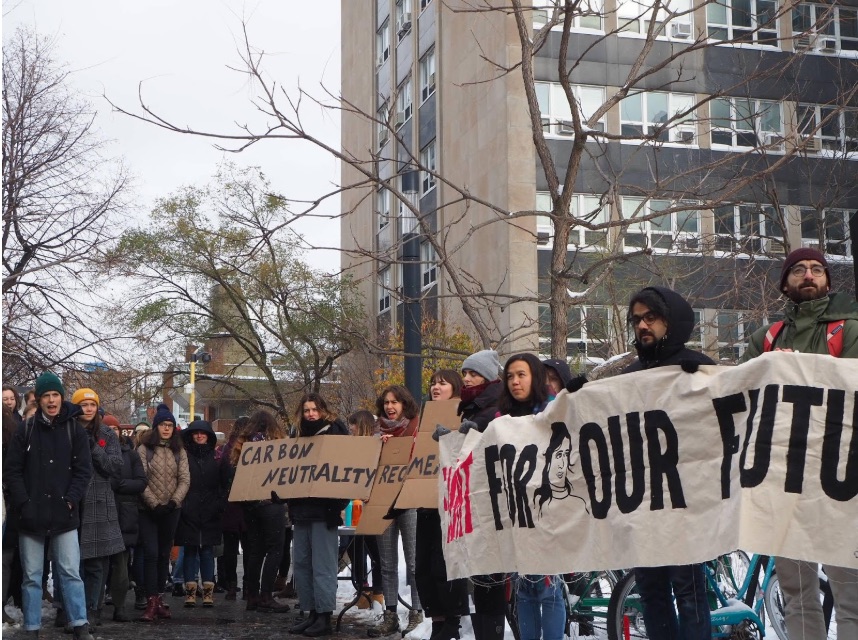Gathered around the snowy steps of the McGill Community Square on Nov. 12, over 200 students and faculty took part in a walkout calling for the university to divest from fossil fuels. The protest was co-organized by Divest McGill, Greenpeace McGill, and Climate Justice Action McGill (C-JAM).
Protestors chanted and cheered as speakers called on McGill’s Committee to Advise on Matters of Social Responsibility (CAMSR) to support their demand that the university divests from the top 200 largest fossil fuel companies. CAMSR, who was meeting simultaneously in the James Administration Building adjacent to the Square, was finalizing recommendations on divestment to be approved by the Board of Governors on Dec. 5. Divest McGill organizers hoped that the protest would be loud enough to be heard from inside the building.
Speaker Dr. Jen Gobby, PhD ‘16, returned her bachelor’s diploma in disapproval of McGill’s refusal to divest from fossil fuels. She expressed her disappointment with the university’s immutability on the issue.
“It’s 2019 […] and still, this institution is invested, as in financially benefiting, from an industry that is killing people, ravaging ecosystems and threatening the future of its student body,” Gobby said. “McGill, […] by continuing to invest in fossil fuels, is strengthening the resilience of an energy system that needs to die.”
Gobby, who recently finished her PhD at McGill in economics in the Anthropocene program, also highlighted the socio-economic consequences of climate change.
“We know that climate change is exacerbating existing social inequality and injustice,” Gobby said. “That people already marginalized by systemic racism, sexism, poverty, and colonialism are bearing the worst of the impacts, first and hardest.”
Concordia student Emily Carson-Apstein, who spearheaded Concordia’s successful divestment campaign as the external sustainability coordinator for Sustainable Concordia, encouraged protestors to remain resilient and criticized both universities’ administration for their inaction to negotiate greener investments.
“I know that this is not a financial movement, it is a social one,” Carson-Apstein said. “Oil is holding up the capitalist colonial history of Canada. They can talk about percentages, and [socially responsible investing] and long-term goals, and we kept saying ‘sure, but there are kids out there who don’t have clean water’.”
Student organizer Laura Mackay, U4 Environment, stressed that McGill has historical precedents for divestment campaigns. She noted the university’s cessation of business ties with companies in South Africa’s apartheid regime in 1985 and divestment from the tobacco industry in 2007.
“Now, in 2019, we’re demanding that the university follows its own precedent and divests from another injurious industry,” Mackay said.
Professor Gregory Mikkelson, professor of environment and philosophy and president-elect of the McGill Association of University Teachers, has been part of the divestment campaign since it began in 2012. He congratulated protestors on their tenacity, despite the meager progress the campaign has achieved in the past seven years.
“Our bosses failed in their gambit to wait until a few troublemakers graduated,” Mikkelson said. “Those troublemakers passed on their arguments, their stories, their passion and the professors they roused from this ivory cloister.”
Despite the frigid temperature, most participants remained till the end of the protest, enthusiastically relaying cheers. For Katie Ross, U3 Science and member of Greenpeace McGill, the turnout demonstrated students’ eagerness for change.
“I think it sends the message that were a unified force,” Ross said. “[We are] not going to stop […] until we reach divestment from fossil fuels.”








